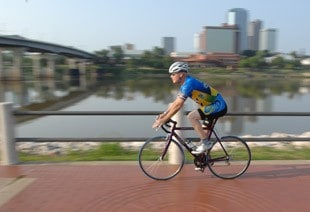Road to Recovery
| 
If there’s one thing Jeff Snodgres can do, it’s defy the odds.
During a routine physical exam at age 10, Jeff, a self-proclaimed “military brat,” was found to have protein in his urine. Because he lacked any other symptoms, doctors were unable to determine the exact cause. However, they suspected Alport Syndrome, a hereditary kidney disease that also can affect hearing and vision.
“The military doctors told my parents that most Alport patients would either require a kidney transplant or would pass away by age 19,” Jeff said. They also told his parents to discourage any physical activity for fear it would worsen the condition.
“I was fortunate that my parents didn’t listen to the doctors. They let me do what I wanted to do,” he said, which included becoming an all-American distance runner in high school and college.
Jeff’s athletic ambitions didn’t end at graduation. In fact, he set his sights on the ultimate goal: competing in the Olympics. In 1988, after qualifying as a member of the Olympic cycling team, Jeff’s dream could have come to a screeching halt when, during a training session, he was hit by a car.
“It was only three weeks before the games, so I didn’t make it to the Olympics that year,” he said. Instead, he was treated by doctors at UAMS for shoulder and neck injuries. “They got me back on my bike as soon as possible,” he said of his doctors in the Department of Orthopedic Surgery at UAMS.
Jeff soon returned to intense training and began preparing for the 1992 Olympic games in Barcelona, Spain, where he finished eighth in the kilometer track cycling event.
“I returned from the Olympics, was preparing for the World Championships and then planned to turn pro,” he said. It was then, at age 26, that the effects of Snodgres’ Alport Syndrome became a reality.
After getting sick during his intense workouts, Snodgres made an appointment with Dr. George Ackerman, then-chairman of the Department of Internal Medicine at UAMS and the physician who had followed his condition since age 18.
The prognosis was grim: Jeff was in end-stage renal disease. “At that point I shouldn’t have been walking around, much less riding a bike, running, swimming and lifting weights,” he said.
Jeff went on dialysis and three months later — the very day he had planned to run a 10K — received word that a kidney was available. Dr. Gary Barone, clinical director of the UAMS Kidney and Pancreas Transplant Program, performed the surgery.
It wasn’t long after his recovery that Snodgres felt the call of the road and started training again. In 1994, 1996 and 1998 he participated in the U.S. Transplant Games, taking home gold medals from each. The Transplant Games is a four-day athletic competition for recipients of organ transplants and is the world’s largest gathering of organ recipients and donor families.
In 1998, he also took first place in cross country mountain bike in the 30-34-year-old class at the NORBA (National Off-Road Bicycle Association) National Championships, as well as a bronze medal at the International Cycling Union World Championships. “I was really proud of that,” he said.
After returning from the world competition, Jeff soon became ill. Tests revealed that he was again in renal failure, and he was put on dialysis. After nine months, a kidney became available. Barone performed the second surgery in 1999, and his follow-up care is still monitored by Dr. Sameh Abul-Ezz, professor in the Division of Nephrology.
Although he had to put aside his athletic lifestyle for several years following his second transplant, Snodgres is now training again, this time with the ultimate goal of competing in the Iron Man World Championship in Hawaii, which includes a 2.4 mile swim, 112 mile bike race and 26.2 mile run.
He also now works in the place where he has been a patient for more than 20 years. “I’ve always loved UAMS. It’s an honor to have been a patient here for so long,” he said. “When I decided to change careers about five years ago, my best friend encouraged me to come to work with him in Information Technology. It’s been an amazing journey going from being a patient to being a member of the UAMS family.”
To learn more about the personalized care provided by our doctors using state-of-the-art equipment and technology, please visit our medical services section.
